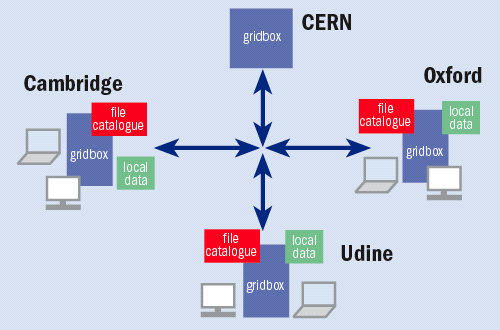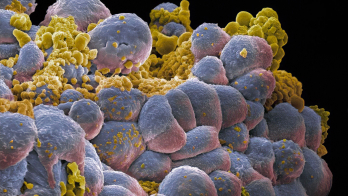There would be great benefits if clinicians around the world could gain access to a common support resource in diagnosing breast cancer. MammoGrid, a three-year project under the Fifth Framework Programme (FP5) of the European Community was completed in 2005 and its partners are now exploring the possibilities for developing a commercial product based on the project’s results.

Led by CERN, MammoGrid involves the universities of Oxford, Cambridge and the West of England in the UK, together with Mirada Solutions of Oxford, and the universities of Pisa and Sassari and hospitals in Udine and Torino in Italy. The project was conceived within the Technology Transfer Group and the Physics Department at CERN, and an FP5 project was established with total resources of €1.9 m.
Breast cancer is the most common cancer in women, and mammograms as images are extremely complex with many degrees of variability across the population. Breast-cancer screening procedures suffer from several complications with a relatively high error rate. It is estimated that around 30% of mammograms give false results. Early and unequivocal diagnosis is therefore a fundamental requirement for early diagnosis and reduced cancer mortality.
One effective way to manage disparate sources of mammogram data is through a federation of autonomous multi-centre sites spanning national boundaries. Such collaboration is now being facilitated by Grid-based technologies, which are emerging as open-source standards-based solutions for managing distributed resources. In the light of these new computing solutions, the goal of the MammoGrid project was to develop a Grid-aware medical application to manage a Europe-wide database of mammograms.
The MammoGrid solution utilizes Grid technologies in seamlessly linking distributed data sets and allowing effective co-working among mammogram analysts throughout Europe. Thanks to the Grid infrastructure it is possible to exchange data and images, and carry out remote and more accurate radiological diagnosis. This in turn should lead to decreasing biopsies, standardization of quality-control procedures, improvements in the training of radiologists and provision of sufficient statistics for complex epidemiological studies.
One of the aims of the project was to build a demonstrator for testing in hospitals in Cambridge and Udine. Since the project reached its completion in 2005, the MammoGrid partners have been negotiating a licence and a partnership agreement with an industrial company. Commercialization is still at an early stage, however, and CERN’s Technology Transfer Group is exploring opportunities to disseminate the project results further, both to hospitals and industry. A non-exclusive licence based on the results of the MammoGrid project has been made available and a few companies are interested in using the demonstrator to build a fully functioning operational tool for oncological studies and cancer screening.







